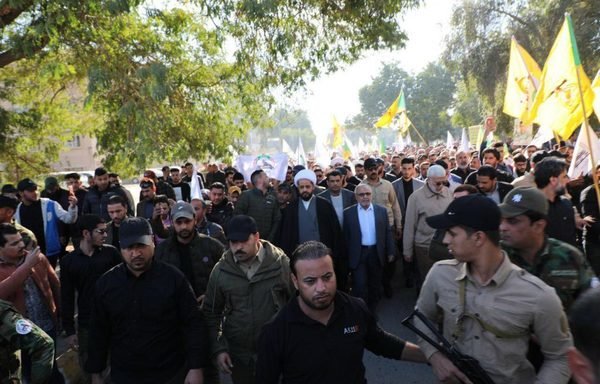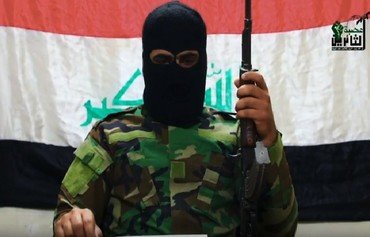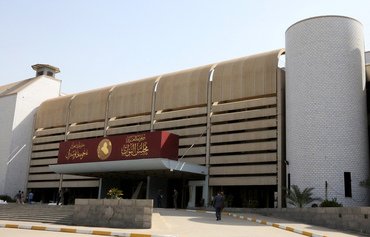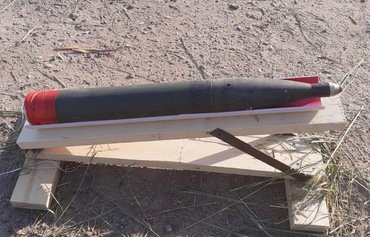This week's attack by Iran-backed Iraqi militias on the US embassy in Baghdad reflects the "barbaric and backward behaviour" of the Iranian regime, an Iraqi expert said.
The attack, orchestrated by Iran on the US embassy in Baghdad, "was led by the Islamic Revolutionary Guard Corps [IRGC] and carried out by Iraqi militias Kataib Hizbullah, Asaib Ahl al-Haq, Badr Organisation and Saraya al-Khorasani", said Ghazi Faisal Hussain, an advisor to the Iraqi Centre for Strategic Studies.
On Tuesday (December 31st), hundreds of elements of militias loyal to Iran massed at the embassy in the high-security Green Zone, broke through a security reception area and scribbled graffiti in support of Tehran.
Setting up some 50 tents and even portable bathrooms, they announced a sit-in at the embassy's gates, but withdrew a day later on orders from the Popular Mobilisation Forces (PMF).
By Wednesday, Iraqi forces had reimposed normal security measures around the perimeter of the Green Zone, usually inaccessible without a badge.
'Policy of violence and chaos'
"The Iranian regime used its proxies to launch a brutal attack similar to what it did four decades ago when its militias attacked the US embassy in Tehran and detained 52 American citizens for 444 days," Hussain told Diyaruna.
"The recent attack shows once again the terroristic intentions of the regime in Iran, which adopts a policy of violence and chaos in order to cover up its weakness and collapse under the economic pressures," he added.
"With this behaviour, Iran's leaders assert that they are keen to keep up their hostile policies and continue with their actions aimed at spreading unrest and instability in Iraq and all neighbouring countries," noted Hussain, a former diplomat.
"The Iranian regime is working to set the region on fire and turn it into a battlefield by using the groups that are loyal to it," he said.
The attack on the US mission "is not in line with the nature of the foundations that relations between countries are built upon, most importantly, mutual respect and co-operation," Hussain said.
It marks a "serious violation of the essence of international conventions and agreements such as the Vienna Convention, which obliges states to ensure the security, safety and immunity of diplomatic missions on their soil", he said.
"Iraqi militia members and their leaders who were present during the attack on the US embassy have revealed their true face and showed the whole world their blind dependence on Iran and their following of the Iranian agendas at the expense of Iraq's sovereignty and interest," Hussain said.
Militias 'do not represent Iraqi people'
"The writings, slogans and banners they raised during the attack that swear allegiance to Iran's [Supreme Leader Ali] Khamenei and [IRGC Quds Force commander] Qassem Soleimani and their militia flags are the best evidence that they are not part of Iraq," according to Hussain.
"These groups do not represent the Iraqi people who are today protesting in Tahrir Square in Baghdad and other provinces to express their rejection of Iranian interference," he said.
The protestors "are demanding that their country be independent from the domination of Iran and its proxies, raising only Iraqi flags and chanting slogans that reflect their love of their country", he added.
"What happened in front of the US embassy was an attempt to draw people's eyes away from the popular protests now in their fourth month," said Ahmed Mohammad Ali, a student protestor in the southern hotspot city of Nasiriyah.
"We're still here, protesting for change and hoping for victory," he told AFP.
The attack on the embassy took place after US Sunday airstrikes that killed 25 Kataib Hizbullah fighters.
The airstrikes were launched in retaliation to missile attacks blamed on Iran-backed militias in recent weeks on Iraqi camps hosting US forces charged with training Iraqi army members.
The most recent incident was a missile attack on December 27th against Camp K1 in Kirkuk province that killed an American contractor and injured a number of US and Iraqi soldiers.
On Wednesday morning, crowds of men brandished the PMF's colours and hurled rocks towards the US compound. Security personnel inside responded with tear gas.
Iraq's caretaker Prime Minister Adel Abdul Mahdi called on the crowd to leave the embassy, but most spent the night in dozens of tents set up outside the perimeter wall.
By the afternoon, the PMF called on its supporters to leave the embassy and regroup outside the Green Zone "out of respect for the state".
AFP's photographer saw protestors dismantling their tents and leaving the Green Zone.
'US prepared to deter bad behaviour'
US officials have pressured Iraqi authorities to step up security and sent a rapid response team of Marines overnight to help guard the compound.
Pompeo spoke with Prime Minister Adel Abdul Mahdi Wednesday and "noted the measures the Government of Iraq has taken to improve the security situation", the State Department said.
Pompeo also stressed it was the Iraqi government's responsibility to prevent further attacks on the embassy, it added.
No US personnel were injured in the attack and US officials said they had no plans to evacuate.
On Thursday, more than a dozen black armoured vehicles of the US-trained Iraqi Counter-Terrorism Service deployed on the embassy's streets in the Green Zone to reinforce security there.
The Pentagon warned that the Iran-backed group that stormed the embassy would carry out more attacks on US facilities -- and would regret it.
"The provocative behaviour has been out there for months," said US Defense Secretary Mark Esper.
"So, do I think they may do something? Yes. And they will likely regret it.
"We are prepared to exercise self-defence, and we are prepared to deter further bad behaviour from these groups, all of which are sponsored, directed and resourced by Iran."








